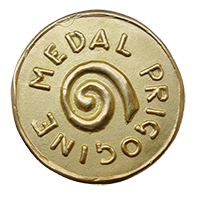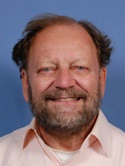 The Prigogine Medal Ceremony for the presentation of the 2020, 2021 and 2022 awards will now take place online on 6th July, during the second day of the 30th International Conference on Modelling, Monitoring and Management of Air and Water Pollution.
The Prigogine Medal Ceremony for the presentation of the 2020, 2021 and 2022 awards will now take place online on 6th July, during the second day of the 30th International Conference on Modelling, Monitoring and Management of Air and Water Pollution.
The Prigogine Award was established by the University of Siena and the Wessex Institute of Technology in 2004 to honour the memory of Professor Ilya Prigogine, Nobel Prize Winner for Chemistry.
Ilya Prigogine
Ilya Prigogine was born in Moscow in 1917 and obtained his undergraduate and graduate education in chemistry at the Free University in Brussels. He was awarded the Nobel Prize for his contribution to non-equilibrium thermodynamics, particularly the theory of dissipative structures. The main theme of his scientific work was the role of time in the physical sciences and biology. He contributed significantly to the understanding of irreversible processes, particularly in systems far from equilibrium. The results of his work have had profound consequences for understanding biological and ecological systems.
Prigogine’s ideas established the basis for ecological systems research. The Prigogine Medal to honour his memory is awarded annually to a leading scientist in the field of ecological systems. All recipients have been deeply influenced by the work of Prigogine.
 Robert Gilmore (2022 winner)
Robert Gilmore (2022 winner)
Prof. Gilmore was raised in Astoria, Queens. He received his undergraduate degrees in Mathematics and Physics from M.I.T. in 1962 and his Ph. D. from M.I.T.'s Physics Department in 1967. He has held professorships at M.I.T. in Cambridge, University of South Florida in Tampa, and Drexel University in Philadelphia.
He has had Visiting Professorships at Alabama A. & M. University in Huntsville, Johann Wolfgang von Goethe Universitat in Frankfurt, The Technion in Haifa, University of Lille I, and Université de Rouen both in France. His research interests are driven by exposure to data and have evolved from Solid State and Molecular Physics to Laser Physics to Catastrophe Theory to Nuclear Physics to the Theory of Chaos, with a forever background interest in the Geometric Formulation of Thermodynamics.
He has written six books on these subjects.
Special Prigogine Lecture
ThermoDynamics and EcoDynamics
Delivered by Professor Robert Gilmore on Wednesday 8th July 2022 during the FRIAR 2022 on-line conference.
Several hints suggest there is a strong similarity between dynamical models of ecological networks and nonequilibrium thermodynamics (state variables, equilibrium/steady state, perturbations, fluctuations, dissipation, forces, fluxes). We formulate such dynamical models in a way to emphasize this similarity and then make the appropriate connections.
Previous Prigogine Laureates
2004 Sven Jorgensen, Denmark
2005 Enzo Tiezzi, Italy
2006 Bernard Patten, USA
2007 Robert Ulanowicz, USA
2008 Ioannis Antoniou, Greece
2009 Emilio del Giudice, Italy
2010 Felix Müller, Germany
2011 Larissa Brizhik, Ukraine
2012 Gerald Pollack, USA
2013 Vladimir Voeikov, Russia
2014 Mae-wan Ho, UK
2015 Bai-Lian Larry Li, USA
2016 Brian Fath, USA
2017 João Carlos Marques, Portugal
2018 Stuart Kauffman, USA
2019 Luc Montagnier, Switzerland
2020 Diederik Aerts, Belgium (award ceremony postponed to 2022)
2021 Simone Bastianoni, Italy (award ceremony postponed to 2022)
For further information about the Prigogine Awards, please contact:
Prigogine Award
Wessex Institute
Ashurst Lodge, Ashurst
Southampton
SO40 7AA, UK
Tel: +44 (0) 238 029 3223
Email:
See the following Web pages for details of the recent Prigogine Awards:
Further details of all Prigogine Awards can be found on our dedicated page: Prigogine Award

 Wessex Institute
Wessex Institute